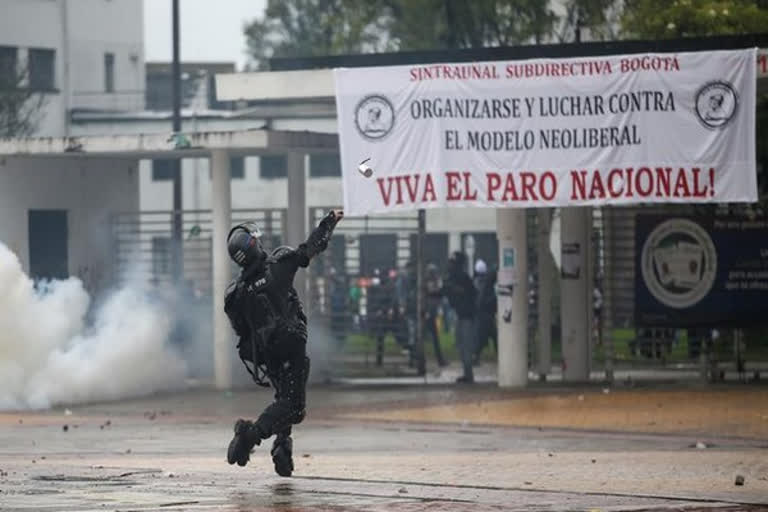Bogota: Several thousands of Colombians took to streets on Thursday to protest against the country's deeply unpopular government that faces public discontentment due to rising unemployment, economic reforms, and a deteriorating security situation.
The South American nation closed its borders ahead of the largest national strike that was expected to hit Colombia in years to prevent foreigners from joining the anti-government protests, media reported.
In the capital, Bogota, police helicopters whirred overhead, while riot police fired teargas at protesters who had blocked bus routes before dawn. Despite torrential rain, thousands of people thronged the city's historic Plaza de Simon Bolivar, singing the national anthem.
Other countries in South America, namely Ecuador, Chile, Venezuela, and Bolivia are also experiencing major social unrest this year as governments in the region struggle to deal with popular grievances over economic stagnation, corruption, inequality and more specific national issues.
Read more: Plane crash claims 7 lives in Colombia
The ongoing protests were described as peaceful overall and under control by Colombia's National Police Director, General Oscar Atehortua, and the Minister of Interior Nancy Patricia Gutierrez.
They counted 13 marches and 27 gatherings in Bogota. Despite some roadblocks, public transportation continues to function normally, they said during a press briefing on Thursday.
While other cities saw minor incidents, the bulk of the violence was reported in the western city of Cali, where protesters attacked a local news crew, burning most of their equipment, police said.
An investigation is ongoing and no detentions have been made, Atehortua added.
The national strike was prompted by proposed cuts to pensions weeks ago. Though the reform was never formally announced, it became a lightning rod for widespread dissatisfaction with the government of President Ivan Duque, whose approval rating has dropped to just 26 per cent since he took office in August last year.
Protesters also expressed anger at the perceived slow-walking of the rollout of the country's historic 2016 peace deal with the leftist Revolutionary Armed Forces of Colombia (or FARC) rebel group. That accord formally ended five decades of civil war that killed 260,000 and forced more than 7 million to flee their homes.
Also read: Colombians stage kiss-a-thon in support of gay rights



